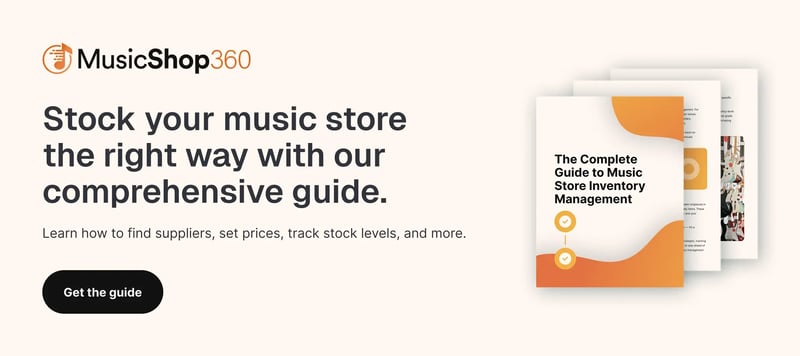
Do you dream of opening a music store?
Maybe you’re an avid musician who wants to share your love of music, inspire the next generation, and make a living for yourself. These are noble goals — but where do you begin? For someone who’s never started a small business before, it can be difficult to know how to open a music shop.
Luckily, we’re here to help. In this blog, we’ll list eight essential steps to opening a music store. By following these steps, you’ll set yourself up for success in a growing industry.
How To Open a Music Shop: A Step-by-Step Process
Following this step-by-step process will help you prepare to open a successful music shop. Remember that these are guidelines, and how you follow these steps will depend on a variety of factors. Consider your location, what kind of music store you want to run, and how you can put your own spin on your business.
Step 1: Conduct Thorough Research
Learning how to open a music shop requires significant preparation. Before making concrete plans to open a music store in your area, do research to understand the demand for musical instruments and services.
The parents of middle school and high school students often become customers of retail music shops when these students want to participate in their school band. Are there middle and high schools in your area? Are private music lessons offered in your area? These questions help you determine how much demand exists.
It’s important to do research on the competition. Are there other music stores in your area? If so, how similar are they to the kind of store you want to run? If there’s a store close by that only sells pianos, and you want to sell guitars, this may not be a problem. If you want to be a general music retailer and there’s another one a few blocks away, it may be difficult to generate business.
As you determine what kind of music store you want to run, consider your target audience. Who are they? What kinds of instruments are they likely to buy? What is their price range? Knowing who you want to target helps you focus your store’s strategy and more effectively draw customers into your music store.
Step 2: Choose the Right Location
Preliminary research is essential in choosing the right location for your music store. In addition to knowing your target market and local demographics, try to find a spot with high foot traffic that is easily accessible.
Placing your music store in a downtown area with more traffic draws in customers, but is also more expensive. Weigh the pros and cons of various locations so you can make the best decision for your store. Make sure the location you choose is easily accessible on foot, by car, and by public transportation and ensure there is sufficient parking.
For your music store to be successful, it needs to be located where there’s a surplus of demand for musical instruments or provide customers with more value than other local music stores. Try to find a space far enough away from other stores that you can dominate the local market.
Step 3: Develop a Comprehensive Business Plan
When it comes to starting a new business, you can’t just wing it. You need a written business plan that outlines both qualitative and quantitative information about your business.
Here are the items to include in your business plan:
- Executive Summary
- Concept
- Mission
- Vision
- Brand values
- Financial Projections
- Startup costs
- Operating expenses
- Revenue forecasts
- Marketing Strategy
- Channels
- Messages
- Operational Plan
- Staffing
- Inventory management
There are many other items you may choose to include in your business plan, including suppliers, e-commerce plans, and website development. Customize your business plan to your business’ unique needs.
Consider asking a financial advisor to look over your business plan to make sure it is realistic, financially sound, and can lead to profitability. Having a business plan you adhere to makes you more prepared for the obstacles you’ll encounter once you get your music store up and running.
Related Read: How Much Does It Cost To Start a Music Store?
Step 4: Obtain Necessary Licenses and Permits
To open a business, you need a business license from the government. While some businesses need licenses and permits from both the state and the federal government, a retail music store only needs a license from the state. You can find more information on the U.S. Small Business Administration’s official website.
You also need a sales tax permit, which is granted by your state government. This permit is needed for any business selling taxable goods or services, and you can typically apply for it online. Be sure to check zoning requirements with your local department of city planning to make sure you’re permitted to have a retail business in the spot you’ve chosen.
Do your research to make sure you have all of the licenses and permits you need to operate. This helps you avoid penalties and fees and gain the trust of local organizations and the public.
Step 5: Set Up a Reliable Point of Sale System
To run a business, you need to be able to take payments. The quickest and most convenient way to do this is with a point of sale (POS) system — but the value of a POS system doesn’t end there. Modern POS systems also offer inventory management, sales reports, website development, marketing, and more.
A solid POS system assists you with a variety of business operations. Music Shop 360 is an all-in-one, cloud-based system that is specifically designed to serve music retail stores. With all the features a music store needs, Music Shop 360 automates tasks you’d otherwise do by hand, saving you time and money.
Related Read: Top Music Store POS Software Providers [Features & Pricing]
Step 6: Source High-Quality Instruments
The kinds of instruments you sell and the standard of quality you maintain will depend on your music store and your target audience. Not every music store needs to sell high-end, professional-level instruments. If you’re targeting students, offer cheaper options. Students tend to be testing out instruments rather than committing to them — making their parents more price-sensitive.
Whether you offer professional-level or beginner-level instruments, stock high-quality instruments. Avoid instruments that will easily break or fall apart on your customers. This promotes customer satisfaction, generates positive word-of-mouth, and reduces returns.
Related Read: Music Store Inventory Management: 5 Best Practices
Step 7: Create an Inviting Music Store Environment
Whether your music store is large or small, there are several strategies you can implement to make the most of your retail space.
Your music store should be easy to navigate. Make sure there’s ample room between shelves and displays so several customers can browse at once. To save space on the sales floor, use wall displays. These also make your products more visible to customers around the store.
If you sell a variety of instruments, organize them into sections, like percussion, brass, or string. If you only sell guitars, for example, organize them into groups like acoustic or electric, or organize them by brand.
Make sure your music store is an aesthetically pleasing environment. Choose a few colors that go well together, and create a unified aesthetic that encompasses your logo, your store, your website, your social media channels, and any other point of contact with the customer.
Customers often want to try playing an instrument before they buy it. Create demo areas with benches where customers can sit down to play a guitar, for example. A place to sit down prevents customers from feeling too rushed and helps them feel more confident in their purchasing decisions.
Step 8: Market Your Music Store Effectively
Setting up your music store will turn a few heads, but to truly be successful, you need to strategically market your store through a variety of channels. An online presence for your store is a necessity. Potential customers need to be able to stumble upon your store online and find your location and hours. Social media also helps you promote brand awareness and increase your audience.
Don’t be afraid to promote your brand through more traditional media channels — including newspapers, radio, magazines, and television — but be mindful of the audiences of these channels and whether or not you’re targeting these audiences.
Put work into creating great ads — or hire talented individuals to make them for you. Further promote your brand through in-person interactions at community events or at events you host in your music store.
Implementing a multi-faceted marketing strategy helps you reach a wider audience that encompasses a variety of different age groups. Pay attention to how much business you’re getting from each source of marketing. You can get this information from surveys, and it will help you determine which strategies to continue with and which to drop. Over time, you’ll create a customized marketing strategy that works for your music store.
Related Read: How To Market a Music Store: 7 Steps to Success
How To Open a Successful Music Shop
When you’re starting a small business, it can seem like there are a million things to do. When things get overwhelming, it helps to break large, vague tasks down into smaller, more specific tasks.
To get your music store off the ground, start with these 8 steps:
- Step 1: Conduct thorough research.
- Step 2: Choose the right location.
- Step 3: Develop a comprehensive business plan.
- Step 4: Obtain necessary licenses and permits.
- Step 5: Set up a reliable POS system.
- Step 6: Source high-quality instruments.
- Step 7: Create an inviting store environment.
- Step 8: Market your music store effectively.
By following these steps, you’ll prepare yourself to handle whatever your business throws at you. Remember: Do plenty of prior research so you can make educated decisions about your store.
Look at what’s made other music retail stores successful. Follow the examples of successful stores, but remember to make your business unique to differentiate yourself from the competition.
And of course, don’t forget to set your business up with the best POS system for music stores: Music Shop 360. Music Shop 360 offers industry-specific features that make running a music store easier. With access to vendor catalogs and functionality for work orders, rentals, and private lessons, your business will have all the resources you need to succeed in the industry.
Contact us today to schedule a demo!




 by
by 



